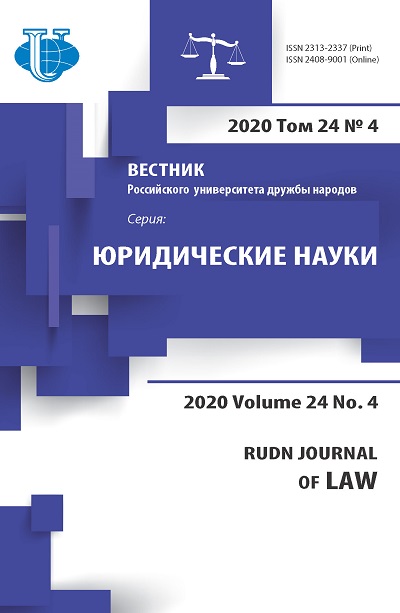КОММУНИКАТИВНЫЕ БАРЬЕРЫ В СУДЕ С УЧАСТИЕМ ПРИСЯЖНЫХ ЗАСЕДАТЕЛЕЙ И ОРГАНИЗАЦИОННО-ПРАВОВЫЕ СПОСОБЫ ИХ ПРЕОДОЛЕНИЯ
- Авторы: Буштец Н.В.1
-
Учреждения:
- Национальный исследовательский университет «Высшая школа экономики»
- Выпуск: Том 24, № 4 (2020)
- Страницы: 1169-1186
- Раздел: ПРОЦЕССУАЛЬНОЕ ПРАВО
- URL: https://journals.rudn.ru/law/article/view/25258
- DOI: https://doi.org/10.22363/2313-2337-2020-24-4-1169-1186
- ID: 25258
Цитировать
Полный текст
Аннотация
Применение института присяжных заседателей в России с 1 июня 2018 г. было расширено. Сегодня суды с участием присяжных заседателей рассматривают уголовные дела в областных судах, приравненных к ним, а также в районных судах. Одновременно законодательные нововведения коснулись числа граждан, состоящих в коллегии присяжных заседателей. Приведенные изменения диктуют необходимость научного осмысления произошедшего, включая выработку предложений, направленных на оптимизацию работу судов, представителей государственного обвинения и защиты с присяжными заседателями. В связи с этим целью исследования является совершенствование организации уголовного судопроизводства, осуществляемого судом с участием присяжных заседателей с учетом психологических особенностей деятельности судьи, государственного обвинителя, защитника и коллегии присяжных заседателей. В ходе работы автором рассматриваются результаты психолого-правовых исследований, в той или иной мере затрагивающих коммуникативные особенности участников уголовного судопроизводства. В работе делаются следующие основные выводы: а) установить в нормативных правовых актах Судебного департамента основные требования к перечню имущества и технических средств, обеспечивающие комфортные условия для присяжных заседателей во время судебного процесса; б) вести системную работу с кадровым составом судей, сотрудниками аппарата суда, взаимодействующих с присяжными заседателями с учетом рекомендаций, приведенных в настоящей статье; в) обеспечить судей и работников аппарата суда методической помощью по вопросам работы с присяжными заседателями.
Об авторах
Никита Владимирович Буштец
Национальный исследовательский университет «Высшая школа экономики»
Автор, ответственный за переписку.
Email: n.bushtets@mail.ru
аспирант, кафедра cудебной власти; референт отдела правовой экспертизы Правового департамента Министерства просвещения Российской Федерации
101000, Российская Федерация, г. Москва, ул. Мясницкая, д. 20Список литературы
- Абакумова И.В., Мельниченко Д.В. Ценностно-смысловые барьеры в учебном процессе: виды и технологии преодоления. Методические указания. М.: Изд-во «КРЕДО», 2011. 20 с.
- Актуальные проблемы деятельности судов общей юрисдикции Российской Федерации: учебник / коллектив авторов; под ред. В.М. Бозрова. М.: ЮСТИЦИЯ, 2017. 568 с.
- Брижак З.И. Психологические проблемы суда присяжных // Ежегодник РПО: Материалы III РПО, 23-25 июня 2003 г., Т. 1. Спб.: Изд. Петербургского ун-та, 2003. C. 424-427.
- Ботоканов А.И., Сарымсаков А.А., Эсеналиева В.А. Значение памяти в обучении //Известия вузов (Кыргызстан). 2015. № 3. С. 141-144.
- Гудков Л., Дубин Б., Зоркая Н. Российская судебная система в мнениях общества // Вестник общественного мнения. 2010. № 4 (106). С. 7-43.
- Гулевич О.А. Психология в суде присяжных: учебное пособие // О.А. Гулевич. Псков: Американская ассоц. юристов, 2011. 136 с.
- Гулевич О.А., Сариева И.Р. Социальная психология. Учебник и практикум для академического бакалавриата. М.: Юрайт, 2015. 452 с.
- Демичев А.А., Илюхина В.А. Женщина перед судом присяжных в Российской империи (к вопросу о принципе гендерного равенства) // Вестник РУДН. Серия: Юридические науки. 2020. Т. 24. № 1. С. 98-112. doi: 10.22363/2313-2337-2020-24-1-98-112.
- Карнозова Л.М. Присяжные о суде присяжных // Суд присяжных в России: совершенствование процедур и расширение юрисдикции / [составитель Л.В. Никитинский]. М.: Фонд «Либеральная миссия», 2010. 84 с.
- Коморида А. Суд с участием судебных заседателей: новая система участия граждан в отправлении правосудия в Японии // Уголовное судопроизводство. 2012. № 3. С. 396-409.
- Машарова Т.В. Педагогические теории, системы и технологии обучения: Учебное пособие. Киров: Изд-во ВГПУ, 1997. 160 с.
- Осипова А.А., Дятлова Л.А., Рядинская Е.Н., Лукьяненко М.А. Психолого-педагогические технологии преодоления смыслового барьера в учебном процессе // Российский психологический журнал. 2018. Т. 15, № 1. С. 260-278. DOI: 10.21702/ pj.2018.2.11.
- Пашин С.А. Предложения по совершенствованию суда присяжных в России // В кн.: Аналитический обзор результатов Всероссийского мониторинга по проблемам судебной реформы в Российской Федерации. М.: Р. Валент, 2009. 229 с.
- Petruhin, I.L. (ed.) (2003) Sudebnaya vlast' [Judicial branch]. Moscow, TK Velbi Publ. (in Russian). Судебная власть / под. Ред. Петрухина И.Л. М.: ТК Велби, 2003. 720 с.
- Petruhin, I.L. (2009) Opravdatel'nyi prigovor i pravo na reabilitatsiyu: Monografiya [Not guilty and the right to rehabilitation: Monograph]. Moscow, Prospekt Publ. (in Russian). Петрухин И.Л. Оправдательный приговор и право на реабилитацию: Монография. М.: Проспект, 2009. 192 с.
- Sheinov, V.P. (2017) NLP v ubezhdenii i manipulirovanii [NLP in persuasion and manipulation]. Moscow, AST Publ. (in Russian). Шейнов В.П. НЛП в убеждении и манипулировании. М.: Изд-во АСТ, 2017. 286 с.
- Ухова Л.В. Эффективность рекламного текста: монография. М-во образования и науки Российской Федерации, ФГБОУ ВПО «Ярославский гос. пед. ун-т им. К.Д.Ушинского». Ярославль: Изд-во ЯГПУ, 2012. 375 с.
- Юришина Е.А. Суд присяжных в Испании: историческая ретроспектива, предпосылки возрождения и некоторые отличительные особенности // Вопросы российского и международного права. 2020. Том 10. № 3А. С. 87-98. doi: 10.34670/AR.2020.93.3.016.
Дополнительные файлы















